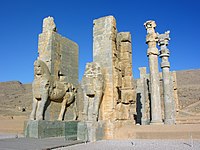Our website is made possible by displaying online advertisements to our visitors.
Please consider supporting us by disabling your ad blocker.
Sarbadars
This article has multiple issues. Please help improve it or discuss these issues on the talk page. (Learn how and when to remove these messages)
|
Sarbadars | |||||||||||
|---|---|---|---|---|---|---|---|---|---|---|---|
| 1337–1381 | |||||||||||
| Capital | Sabzevar | ||||||||||
| Common languages | Persian | ||||||||||
| Government | Absolute Monarchy | ||||||||||
| Leader | |||||||||||
• 1332–1338 | Abd al-Razzaq ibn Fazlullah | ||||||||||
• 1338–1343 | Wajih ad-Din Mas'ud | ||||||||||
• 1343–1346 | Muhammad Temur | ||||||||||
• 1379–1381 | Khwaja 'Ali-yi Mu'ayyad ibn Masud | ||||||||||
| History | |||||||||||
• Independence from the Ilkhanate | 1337 | ||||||||||
• Khwaja Ali-yi Mu'ayyad submits to Timur | 1381 | ||||||||||
| |||||||||||
| Today part of | Iran Turkmenistan | ||||||||||
| History of Iran |
|---|
 The Gate of All Nations in Fars |
|
Timeline |
The Sarbadars (from Persian: سربدار sarbadār, "head on gallows"; also known as Sarbedaran سربداران) were a mixture of religious dervishes and secular rulers that came to rule over part of western Khurasan in the midst of the disintegration of the Mongol Ilkhanate in the mid-14th century (established in 1337). Centered in their capital of Sabzavar, they continued their reign until Khwaja 'Ali-yi Mu'ayyad submitted to Timur in 1381, and were one of the few groups that managed to mostly avoid Timur's famous brutality.
Previous Page Next Page


